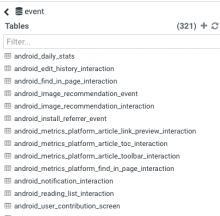First pass data validation for the following migrated schemas:
- event.android_product_metrics_article_toc_interaction (https://schema.wikimedia.org/#!/secondary/jsonschema/analytics/mobile_apps/product_metrics/android_article_toc_interaction)
- event.android_product_metrics_find_in_page_interaction (https://schema.wikimedia.org/#!/secondary/jsonschema/analytics/mobile_apps/product_metrics/android_find_in_page_interaction)
in core_interactions schema
- event.android_product_metrics_article_link_preview_interaction (and android_metrics_platform_article_link_preview_interaction)
- event.android_product_metrics_article_toolbar_interaction
Results will be tracked here in this ticket.
